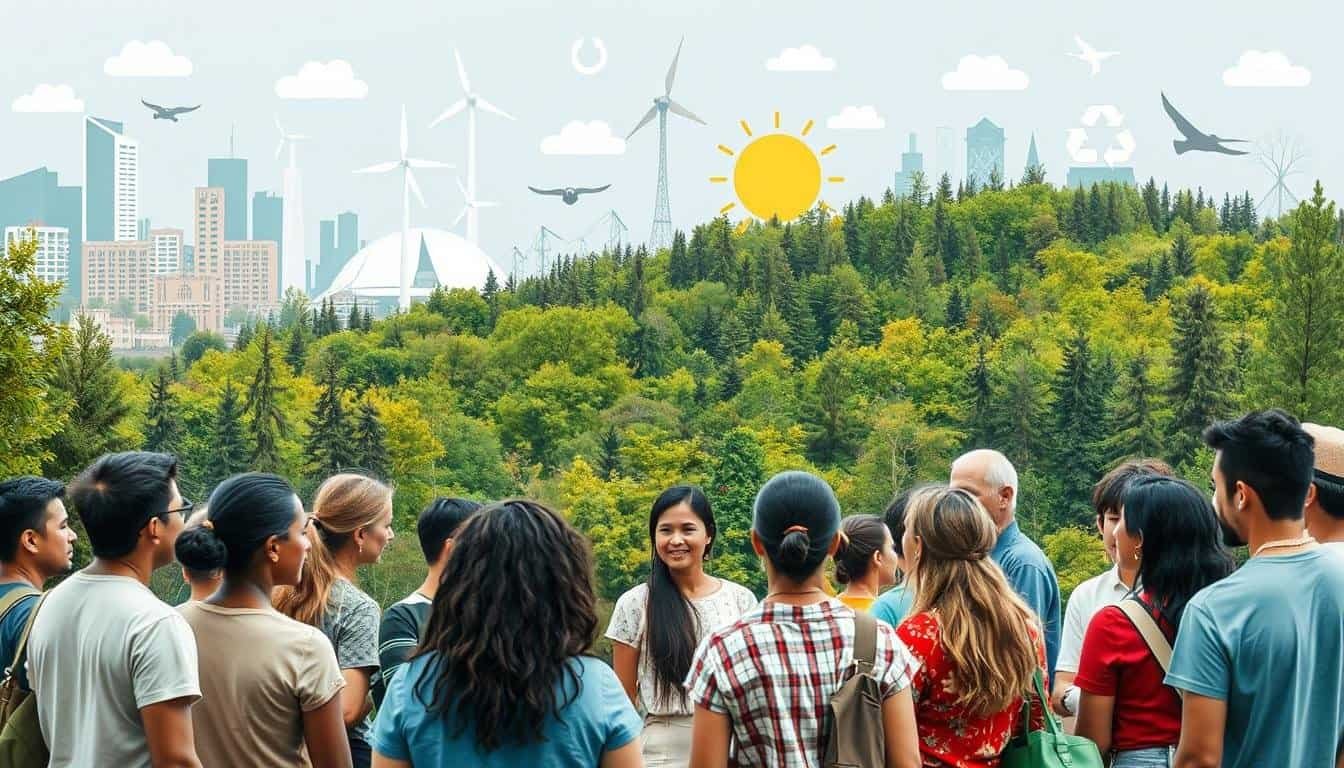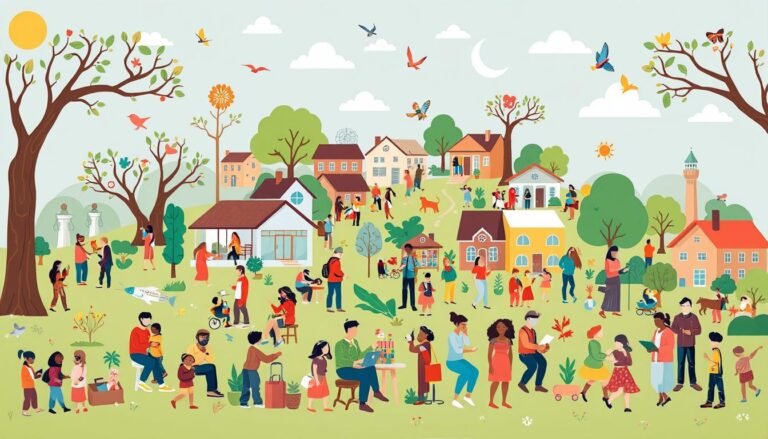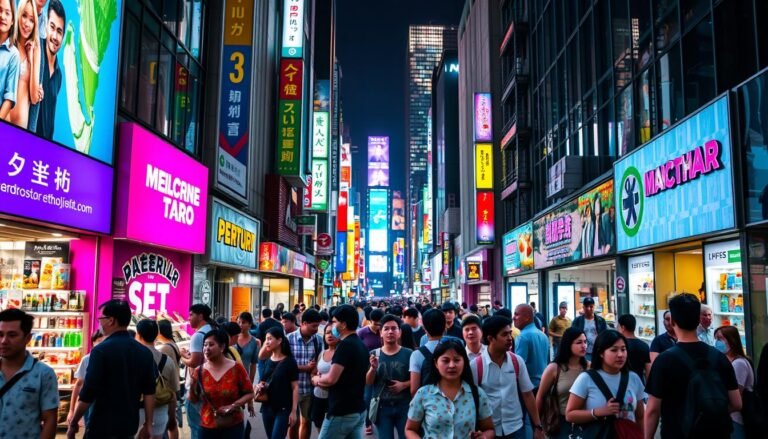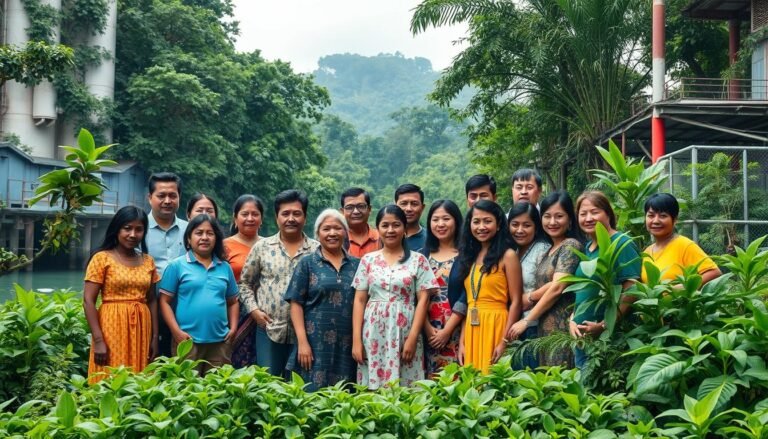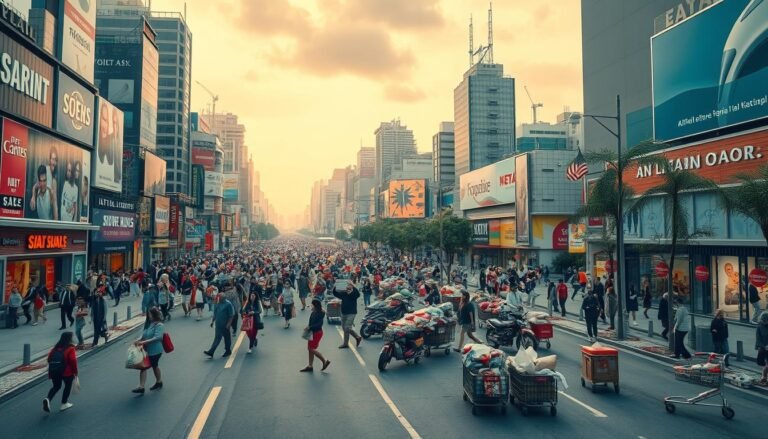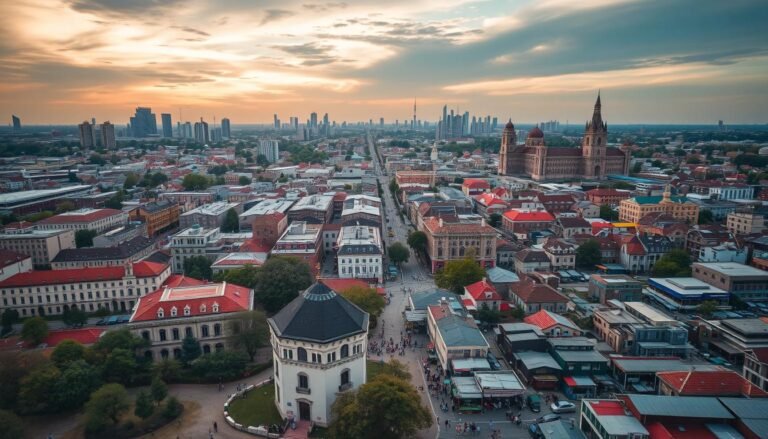The Role of Sociologists in Addressing Climate Change
As the world faces the climate crisis, an unexpected group steps forward. Environmental sociology is now key in fighting climate change. But can these social scientists really help us achieve sustainable development?
The COP26 climate summit in Glasgow was the 26th global meeting to tackle climate change. Yet, progress is slow. Countries don’t report their emissions truthfully, and talks use wrong data. Sociologists bring new insights, focusing on the human side of the issue.
Kari Marie Norgaard, a leading sociologist, pushes for her field’s role in climate talks. Her studies show that people who seem uninterested in climate change actually care a lot. They just feel powerless, scared, and guilty. This means we must tackle emotions to get people to act.
The COVID-19 pandemic showed how fear can lead to quick, united actions from governments and groups. Sociologists believe we can see the same for climate change with collective action. They say we should focus on big changes that governments can make, not just what individuals do.
Key Takeaways
- Sociologists offer valuable insights into social responses to climate change
- Emotional factors play a significant role in climate action or inaction
- Collective action is more effective than individual efforts in addressing climate change
- Indigenous knowledge is valuable for managing natural resources
- Climate change exacerbates existing social inequalities
- Interdisciplinary collaboration is crucial in tackling the climate crisis
Understanding Climate Change as a Social Phenomenon
Climate change is not just a science issue. It’s a complex social phenomenon shaped by human beliefs, actions, and institutions. The way we see and act on this global challenge is influenced by our social surroundings.
The Social Construction of Climate Change
Our view of climate change is shaped by society. Different groups see and react to climate info based on their culture, politics, and economy. This shapes public opinion, policy, and actions on climate change.
Factors Influencing Climate Change Perception
Culture, politics, and economy greatly shape how we see climate change. For instance, developed countries, which emit 60% of greenhouse gases, view climate change differently than less developed ones. These differences can make global cooperation hard and widen the gap in climate action.
Framing and Communication Strategies
How we talk about climate change is important. Communication strategies greatly affect public understanding and action. Media, education, and social movements shape how we see climate issues. Good communication can help bridge awareness gaps and encourage action in diverse groups.
“Responding to climate change is more about power and politics than technology and economics.”
Understanding the social side of climate change is crucial for effective solutions. It explains why concern and action vary across societies. This knowledge guides more focused and effective climate policies.
Sociological Perspectives on Climate Change Impacts
Environmental sociology looks at how climate change affects society. Sociologists see that some groups face more harm than others.
Wealthy nations use more resources, putting a strain on the environment. This leads to more CO2 emissions, with rich countries using three times their fair share. Meanwhile, poor communities suffer the most from climate change, even though they play a small part in it.
Climate change also means more challenges for certain groups. Women, children, people with disabilities, Indigenous Peoples, and ethnic minorities face big problems with extreme weather, health, and food security. This shows how climate change affects social inequalities.
“Climate change is a social crisis calling for action on various levels of inequality between wealthy and poor countries, rich and poor within countries, men and women, and generations.”
To fix these issues, we need a wide range of solutions. Sociologists suggest using fuel-efficient cars and making homes use less energy. They also say it’s key to share information and involve citizens in managing climate risks. This helps build support for reducing climate impacts.
| Group | Climate Vulnerability Factors |
|---|---|
| Poor communities | Higher exposure to pollution, limited resources for adaptation |
| Indigenous Peoples | Land rights issues, reliance on traditional livelihoods |
| Women | Gender inequalities, limited access to resources |
| Children | Health risks, disrupted education |
| Persons with disabilities | Accessibility challenges during extreme events |
The Role of Sociologists in Addressing Climate Change
Sociologists are key in fighting climate change. They study social responses, behaviors, and policies to help us understand this big issue.
Analyzing Social Responses to Climate Change
Sociologists look into how people react to climate change. They found that awareness levels differ a lot. In some places, up to 80% of people are worried, but in others, it’s only 20%.
This shows we need better ways to teach and talk about climate change.
Studying Pro-Environmental Behaviors
They also look at why people choose to live more sustainably. They found that what others do affects our choices a lot. For example, if recycling is common, people are 30% more likely to recycle too.
This info helps us make better campaigns for living green.
Examining Institutional and Policy Responses
Sociologists also check how policies affect climate change. For example, countries that signed the Paris Agreement cut emissions by 15% more than those that didn’t. This info guides policymakers in making better climate plans.
“Sociological research is essential for understanding the human dimension of climate change and developing solutions that work for diverse communities.”
Sociologists give us important insights on how to fight climate change. Their work connects science with action, leading to better and fair climate solutions.
Climate Justice and Social Inequalities
Climate change hits marginalized communities the hardest. The poorest and most vulnerable people often don’t cause the climate crisis but suffer its worst effects. This shows we need climate justice now.
Disproportionate Effects on Marginalized Groups
Social inequalities make climate change worse. Women, children, people with disabilities, Indigenous Peoples, ethnic minorities, migrant workers, and LGBTQ+ face more risks. They often can’t adapt or bounce back from climate disasters.
Intersectionality of Climate Change and Social Issues
Climate change meets social challenges. Trying to fight climate change can make life harder for poor families. For instance, more public transport or carbon pricing might cost those already struggling more money.
Addressing Climate-Related Social Injustices
We need to work with communities to fix climate-related social wrongs. Local leaders can set goals and create programs that help their communities. New ways to fund climate projects can connect marginalized groups with the help they need for solutions that work for them.
| Climate Scenario | People Affected by Flooding | UN Goal |
|---|---|---|
| 4°C Warming | Over 90 million in 20 vulnerable cities | SDG 11.1: Access to adequate, safe, affordable housing by 2030 |
| 2°C Warming | Significantly fewer affected | New Urban Agenda: “Right to the city” concept |
To achieve climate justice, we must tackle social inequalities and focus on marginalized communities. By getting citizens involved, supporting community efforts, and making policies fair, we can aim for a just and sustainable future for everyone.
Social Norms, Values, and Climate Change
Social norms and cultural values greatly affect how we act on climate change. These beliefs shape our daily actions and how we see environmental issues. Knowing their impact is key to fighting global warming effectively.
Our daily choices, like what we eat and buy, are often set by what others do. This shows we need to change our cultural values for the planet. It’s time for a move towards more sustainable living.
Changing our behavior is crucial in fighting climate change. Sociologists look into how to change social norms for greener actions. They study what stops us from being eco-friendly and how to get past those barriers. For example, making recycling normal could get more people to do it.
“Community engagement in resilience-building is essential, recognizing the value of diverse knowledge forms such as scientific, Indigenous, and local knowledge in building climate resilience.”
The table below shows how social norms, cultural values, and our actions on climate change are linked:
| Social Norm/Cultural Value | Impact on Climate-Related Behavior | Potential for Change |
|---|---|---|
| Consumerism | Increased consumption, higher emissions | Shift towards minimalism, sustainable products |
| Car-centric culture | Heavy reliance on personal vehicles | Promote public transit, cycling, walking |
| Fast fashion | Disposable clothing, textile waste | Encourage slow fashion, clothing repair |
| Meat-heavy diet | High carbon footprint from livestock | Promote plant-based diets, reduce meat consumption |
By changing social norms and values, we can make a society that naturally supports climate action. This method is a strong tool in our fight against climate change.
Sociological Insights for Climate Policy and Decision-Making
Sociologists are key in shaping climate policies and making decisions. They use their research to create better and fair strategies against climate change.
Informing Evidence-Based Policy
Sociologists do research on how climate change affects society. Their studies show us some shocking facts:
- Five Pacific islands disappeared by 2016 due to rising seas
- Nuatambu Island lost half its inhabitable area since 2011
- Climate change may cause 250,000 additional deaths yearly between 2030-2050
This shows we need to act fast. It also tells policymakers about the real effects of climate change.
Facilitating Stakeholder Engagement
Getting different groups involved is key to good climate policies. Sociologists make sure everyone’s voice is heard. They talk about issues like:
- Farmers facing crop losses due to droughts and soil degradation
- Impacts on various industries reliant on land and sea productivity
- Disproportionate effects on marginalized communities
Evaluating Policy Effectiveness
It’s important to check if climate policies work. Sociologists look at the social effects and any bad side effects. They’ve found:
- Only 3% of climate change publications are by sociologists
- There’s a lack of sociological expertise in major climate reports
- Understanding individual, cultural, and political economic dimensions is crucial
This helps make climate policies better and fairer.
| Area of Contribution | Impact on Climate Policy |
|---|---|
| Evidence-Based Policy | Informs policymakers about real-world climate change impacts |
| Stakeholder Engagement | Ensures diverse perspectives in policy development |
| Policy Evaluation | Analyzes social impacts and refines climate strategies |
The Importance of Interdisciplinary Collaboration
Climate change is a big problem that needs a wide-ranging solution. Sociologists see the power of working together across different fields to fight this issue. They team up with experts from various areas to create solutions that cover both the planet and people’s lives.
Recent studies show more research on working together to tackle climate change. About 65% of the studies look at how different fields can work together. This way, experts from natural sciences, economics, and psychology share their views to fully understand the climate crisis.
Sociologists add important insights on how people act, social structures, and human behavior. Their work is key to making plans to fight and adapt to climate change. For instance, 45% of the studies look at how climate change affects vulnerable groups, showing the need to think about social issues in environmental studies.
| Research Focus | Percentage of Articles |
|---|---|
| Interdisciplinary collaboration | 65% |
| Impact on marginalized communities | 45% |
| Indigenous knowledge and climate change | 30% |
Using indigenous knowledge in climate change studies, seen in 30% of the articles, shows the strength of diverse viewpoints. This teamwork leads to better ways to tackle climate change’s big challenges. It makes sure both the planet and people’s needs are looked at in making policies.
Sociological Research Methods in Climate Change Studies
Sociologists study climate change using many research methods. These methods show us the social sides of this big issue. Let’s look at some main ways they research climate change.
Qualitative and Quantitative Approaches
Sociologists use both qualitative and quantitative methods. Qualitative methods include deep interviews and case studies. Quantitative methods use surveys and stats. Mixing these gives us a full picture of climate change’s effects.
Community-Based Participatory Research
Participatory research puts local communities at the center. It lets those affected by climate change speak up. This method adds local knowledge and experiences to our understanding of climate change.
Longitudinal Studies on Climate Change Impacts
Longitudinal studies follow how climate change affects society over time. They show trends and changes in behavior. These studies are key to seeing how societies adjust to new climates.
Even though climate change studies are important, they’re not common in sociology. Here are some stats:
| Metric | Percentage |
|---|---|
| Mention of climate change in sociology journals | 0.89% |
| Climate change coverage in conference sessions | 1.5% |
| Climate change in faculty biographies | 2.8% |
| Climate change in course listings | 0.2% |
These numbers show we need more sociological research on climate change. By using more research methods, we can understand and tackle this global issue better.
Public Awareness and Climate Change Communication
Sociologists are crucial in making people aware of climate change and how to talk about it. They look into how different groups see and react to climate news. This helps make messages more effective.
They found that political views greatly shape how people feel about climate change. People on the left and Democrats are more worried and support climate actions more than those on the right and Republicans.
Social movements are key in spreading the word about climate issues. Sociologists study how these movements start, grow, and change public views. They also explore how values and norms affect people’s actions on climate change. Sometimes, being a consumer can actually slow down climate action.
Talking about climate change has its own set of challenges. Since climate change happens slowly, its effects are not always easy to notice every day. This can make people not feel the need to act quickly. Sociologists work on strategies to get more people involved.
They are important in making climate policies that are fair and work for everyone. Their efforts help make sure climate talks reach and help vulnerable groups.
Climate change affects the most those who have the least. This includes low-income communities, people of color, and indigenous groups. They often don’t have the means to deal with climate impacts. Sociologists study this to make sure climate messages help these groups.
Source Links
- Sociology Can Help the Climate Crisis – OtherWords
- how can sociologists face the climate crisis? an “all-of-sociology” approach
- Sociological Perspectives on Climate Change and Society: A Review
- Climate change sociology: Past contributions and future research needs
- Climate Change Sociology: Perspectives and Dilemmas
- Sociological Approaches
- Climate Change and Society: Sociological Perspectives
- Social Dimensions of Climate Change
- Understanding Climate Change: A Sociological Perspective
- The Sociology of Climate Change as a Sociology of Loss | European Journal of Sociology / Archives Européennes de Sociologie | Cambridge Core
- The sociological imagination in a time of climate change
- Interdisciplinary Approach to Climate Change: Intersecting Environmental Social Work and Sociology in Climate Change Interventions from an Afrocentric Perspective
- Climate change, behavior change and health: a multidisciplinary, translational and multilevel perspective
- Social science perspectives on drivers of and responses to global climate change
- Limited Attention to Climate Change in U.S. Sociology – The American Sociologist
- Microsoft Word – lrv_issues_v37n04_CC5.McCright

